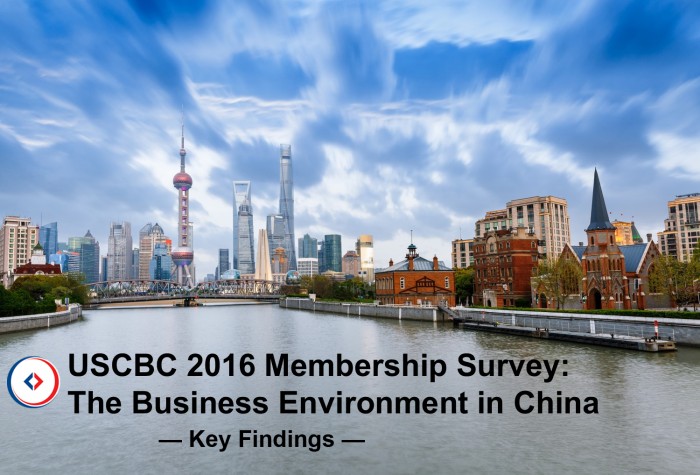Media Report

- The Wall Street Journal comments: "Despite China's attempts at economic reform, U.S. companies say they haven't seen significant changes in the country's business environment three years into the effort, according to a survey of the members of the U.S.-China Business Council. The number of companies that are optimistic or somewhat optimistic about the five-year outlook for China is at its lowest level in a decade, the survey found, with 67% citing the country's policy and regulatory environment as the top issue affecting their outlook. 'Most foreign companies are not seeing benefits from China's economic reforms,' the survey report said....In the survey of the companies comprising the 220-member council, 15% of respondents said their organizations reduced or stopped planned investment in China in the past year, with 31% of those companies citing increasing market-access restrictions as the reason."
- The Washington Post reports: "China has sought information from Filipino authorities to help capture suspected Chinese drug traffickers in the Philippines and wants to forge a stronger anti-drug pact to fight the menace, the Chinese ambassador said, adding it's 'utterly wrong' to say all the drug lords are Chinese....Philippine National Police documents on suspected drug traffickers seen by The Associated Press include a list of 14 Chinese nationals, including a woman, with their pictures. Another document identifies two Taiwanese running a 'drug laboratory' in a northern Philippine province. Their names were not among those read by Duterte in public earlier this month as part of his shame campaign....Duterte's anti-drug crackdown has been the deadliest and most massive in recent Philippine history, with nearly 2,000 suspects dead so far and more than 673,000 others surrendering for fears they may be killed, according to police."
- The New York Times reports: "On a seaside field south of Shanghai, workers are constructing a nuclear reactor that is the flagship for Beijing's ambition to compete with the United States, France and Russia as an exporter of atomic power technology....Still, experts say Beijing underestimates how tough it will be for its novice nuclear exporters to sell abroad. They face political hurdles, safety concerns and uncertain global demand following Japan's Fukushima disaster....The industry is growing fast, with 32 reactors in operation, 22 being built and more planned, according to the World Nuclear Association, an industry group. China accounted for eight of 10 reactors that started operation last year and six of eight construction starts....Still, Beijing is 'seriously underestimating' how hard global sales will be, said Schneider. He said obstacles include strict quality controls, regulations that differ from country to country and competition from the falling cost of wind and solar. 'There is simply no market out there,' said Schneider."
Calendar
- 2016-08-23 UN envoy: China must give public voice to stamp out poverty
- 2016-08-22 China slams U.S.-South Korea military drills even as it stages naval war games of its own
- 2016-08-21 Chhines Ships, Planes Hold War Games in Sea of Japan
- 2016-08-19 Rio 2016: China Rethinks Gold Medal Pursuit at Olympics
- 2016-08-18 China’s Pollution Deaths to Linger After Air Clears, Study Finds
- 2016-08-17 China, ASEAN aim to complete framework of South China Sea rules next year
- 2016-08-16 UK’s May reassures China after nuclear power plant delay
- 2016-08-15 China says no South China Sea at G-20, US urges transparency
- 2016-08-14 China to use tougher environmental standards to tackle capacity glut
- 2016-08-12 How the China Shock, Deep and Swift, Spurred the Rise of Trump
News
- The Washington Post China seeks info on Chinese drug suspects in Philippines
- The New York Times China Sets Sights on New Global Export: Nuclear Energy
- Bloomberg Markets Hostile Raid on China's Biggest Developer Marks New Takeover Era
- Reuters China says opposes anything that causes Korean tensions
- The Wall Street Journal China's Postal Savings Bank to Get $2 Billion Investment for IPO
- BBC News China unveils 2020 Mars mission probe and rover
- Reuters China plans fiscal reforms; aims to reduce central, local government overlap
- The Washington Post Asia & Pacific Japan, China, S. Korea unite in condemning N. Korea missile
- BBC News China's ghost weddings and why they can be deadly
- The New York Times China Seeks Info on Chinese Drug Suspects in Philippines
- The Wall Street Journal U.S. LNG for China Arrives Via Panama Canal
- Bloomberg Business China's Moment in the G-20 Sun Overshadowed by What Lies Beneath
- TIME The Fight to Save the World's Seas From China's Bloated Fishing Industry
Commentary
- The Wall Street Journal The Morning Risk Report: Uneven Enforcement Worries U.S. Firms in China
- The Washington Post China's rise presents a dilemma for Australia
- Bloomberg View Is China's Super-Bus a Scam?
- The Diplomat Duterte: South China Sea Talks With China 'Within The Year'
- The National Interest Electronic Warfare Comes to the South China Sea (and Why it Matters)
- The Wall Street Journal Tibetans Searching for the Dalai Lama May Only Find Nicolas Sarkozy
- The Diplomat China's Growing Arms Sales to Latin America
